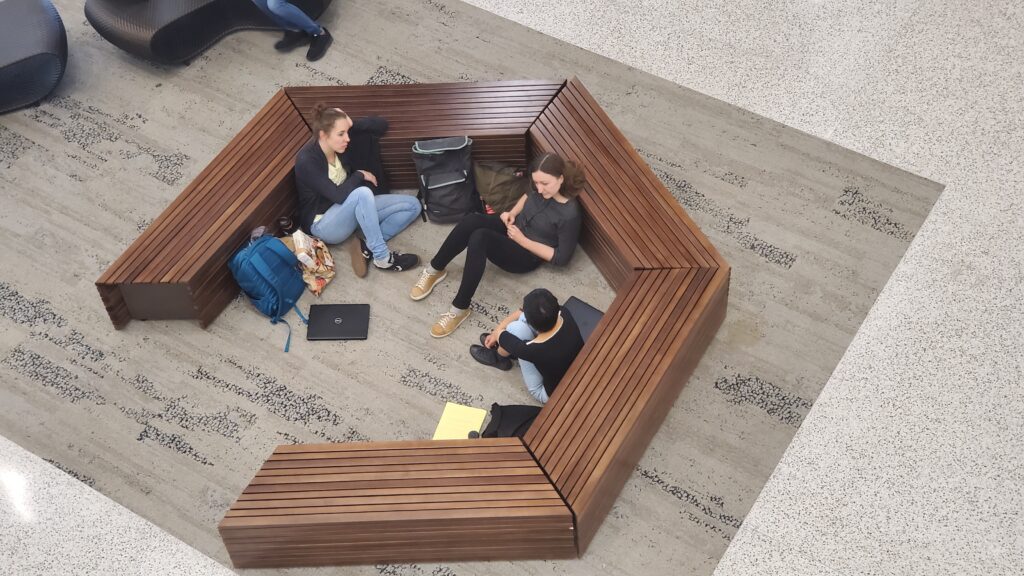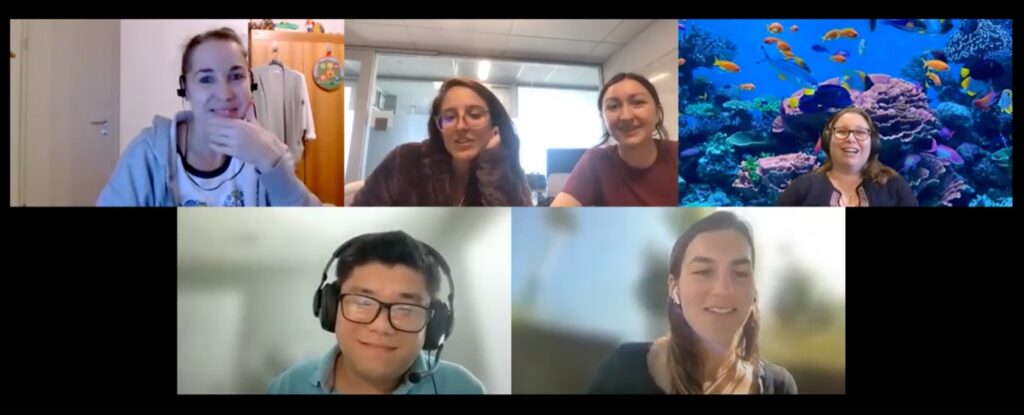Aim: Surveying across design-based research projects centering different Special Education populations, Special Education Embodied Design (SpEED) sets out to develop guiding principles for an embodied approach to accessibility and instructional equity.
Conveners: Sofia Tancredi , Rachel Chen, Christina Krause
Members and Collaborators: Brittney Cooper, Erin Foley, Jacqueline Anton, John Kim, Dr. Yue-Ting Siu, Dr. Dor Abrahamson
Background and Motivation: SpEEDsters are brought together by a common commitment to studying the implications of embodied cognition for learners in special education. With expertise in communication, sensory regulation, cognition, gesture, and mathematics learning, and with diverse design research projects serving different special education populations including learners on the autism spectrum, blind and visually impaired learners, Deaf learners, learners with learning disabilities, and learners with complex communication needs, SpEED looks to synthesize across disciplines to unpack the potential of embodied design for rethinking learning accessibility and guiding inclusive educational design.
Current Design-Based Research Projects:
Focus: The role of sensory regulation in learning for sensory-seeking students
Research questions: How do sensory regulation and conceptual learning impact each other? How might the integration of sensory-regulatory and math learning movements affect learning outcomes?
Focus: embodied and interactional practices of autistic individuals as they navigate their social and material world
Research questions: How can we reimagine communication and joint action in special education? How can design be used to surface the communicative competencies of autistic individuals?
Focus: The role of sign language in conceptualization of mathematical ideas and the individual and social learning processes of deaf and HoH students
Research questions: What can we learn about mathematical ideas and about learning mathematics through the students’ visual-spatial ways of mathematical interaction and reasoning? How can design approaches use the iconic/gestural potential of signs strengths to provide individual and social learning opportunities for deaf students and beyond?
Past events:
SpEED at the SESAME Colloquium
Publications and Presentations:
Tancredi, S., Wang, J. X., Li, H. L., Yao, C. J., Macfarlan, G. L., & Ryokai, K. (2022). Balance Board Math: “Being the graph” through the sense of balance for embodied self-regulation and learning. In M. Horn, M. Giannakos, & T. Pontual (Eds.), Proceedings of IDC ’22: Interaction Design and Children (Vol. “Full papers”, pp. 137–149). https://doi.org/10.1145/3501712.3529743
Lambert, S. G., Tancredi, S., Fiedler, B. L., Moore, E. B., Gorlewicz, J. L., Abrahamson, D., & Gomez Paloma, F. (2022). Getting a grip on geometry: Developing a tangible manipulative for inclusive quadrilateral learning. Italian Journal of Health Education, Sports and Inclusive Didactics, 6(1), 1–21. https://doi.org/10.32043/gsd.v6i1.604
Tancredi, S., Wang, J., Helen Tong Li, Yao, C. J., Ryokai, K., & Abrahamson, D. (2022). Graphing with Balance Board Math: Critical embodied design for regulation and learning. In C. Chinn, E. Tan, C. Chan, & Y. Kali (Eds.), “International collaboration toward educational innovation for all: Overarching research, development, and practices”—Proceedings of the 16th annual meeting of the Learning Sciences (ICLS 2022), Hiroshima, Japan (online) (pp. 1181-1184). ISLS.
Tancredi, S., Chen, R. S. Y., Krause, C. M., & Siu, Y.–T. (2022). The need for SpEED: Reimagining accessibility through Special Education Embodied Design. In S. L. Macrine & J. M. B. Fugate (Eds.), Movement matters: How embodied cognition informs teaching and learning (pp. 197–216). M.I.T. Press.
Lambert, S. G., Tancredi, S., Fiedler, B. L., Gorlewicz, J. L., Abrahamson, D. (2022, April). Building the Quad: A tangible manipulative for inclusive geometry learning. In F. C. Peluso (Chair), The 2nd International Conference on Research on Educational Neuroscience: School, Sports, & Society (REN). Rome, Italy, April 1.
Krause, C. M., Chen, R. S. Y., Tancredi, S., Cooper, B., Foley, E., Anton, J., Kim, J., & Abrahamson, D. (2021, October). Catching up with SpEED: Applying a framework for inclusive equitable learning opportunities through Special Education Embodied Design. Invited workshop, Unimc for Inclusion Settimana dell’inclusione (Inclusion Week), University of Macerata, Italy, October 25, 2021.
Krause, C. M., Chen, R. S. Y., Tancredi, S., Cooper, B., Foley, E., Anton, J., Kim, J., & Abrahamson, D. (2021, October). Catching up with SpEED: Applying a framework for inclusive equitable learning opportunities through Special Education Embodied Design. Invited colloquium talk, Graduate Group in Science and Mathematics Education (SESAME) Colloquium, University of California Berkeley, California, United States, October 21, 2021.
Krause, C. M., Tancredi, S., Chen, R. S. Y. (2021, July). Time for SpEED: Ansätze für inklusiv-gleichberechtigte Lerngelegenheiten durch Special Education Embodied Design (Time for SpEED: Reimagining equitable learning opportunities through Special Education Embodied Design). Invited colloquium presentation, Thursday colloquium of the Interdisciplinary Centre for Educational Research, University of Duisburg-Essen, Germany, July 1, 2021.
Online in five parts (in German; subtitled in German):
- Part 1 – Introduction and Framework: https://youtu.be/MdqHZ-e-_uw
- Part 2 – Project ‚SignEd|Math‘: https://youtu.be/kq4p2DGiz1M
- Part 3 – Project ‚Balance Number Line‘ (Sofia Tancredi): https://youtu.be/VtqIfL2EklY
- Part 4 – Project ‚Magical Musical Mat‘ (Rachel Chen): https://youtu.be/721S2EiuwPQ
- Part 5 – Summary and conclusions: https://youtu.be/Ch7H2hgRdV0
Tancredi, S., Chen, R. S. Y., Krause, C., Abrahamson, D., & Gomez Paloma, F. (2021). Getting up to SpEED: Special Education Embodied Design for Sensorially Equitable Inclusion. Education Sciences & Society – Open Access, 12(1), 114–136. https://doi.org/10.3280/ess1-2021oa11818
Tancredi, S., Chen, R. S. Y., & Krause, C. M. (2021, May 6-9). SpEEDing towards equitable instruction: Special Education Embodied Design for sensory diversity (Panel). Uncommon Senses III: Back to the Future of the Senses, Montreal, Canada.
Tancredi, S., Chen, R. S. Y., Krause, C. M., & Abrahamson, D. (2021, March). Getting up to SpEED: Special education embodied design for sensorially equitable inclusion. Invited keynote in F. Gomez Paloma (Convener), Inclusion Week. University of Macerata, Italy, March 16, 2021.
Tancredi, S., Chen, R. S. Y., Krause, C. M. (2021, November 13). The Need for SpEED: Special Education Embodied Design (Colloquium Talk). Graduate Group in Science and Mathematics Education (SESAME) Colloquium, Berkeley, California, United States.
Tancredi, S., Chen, R. S. Y., & Krause, C. (2020, February 2). The need for SpEED: Special education embodied design (Panel). UC-SpEDDR, Los Angeles, California.
Chen, R. S. Y. & Tancredi, S. (2019, May). Centering disability and neurodiversity in embodied design (Conference presentation). The EMIC Synthesis and Design Workshop: The Future of Embodied Design for Mathematical Imagination and Cognition, University of Wisconsin, Madison, Wisconsin, United States.


